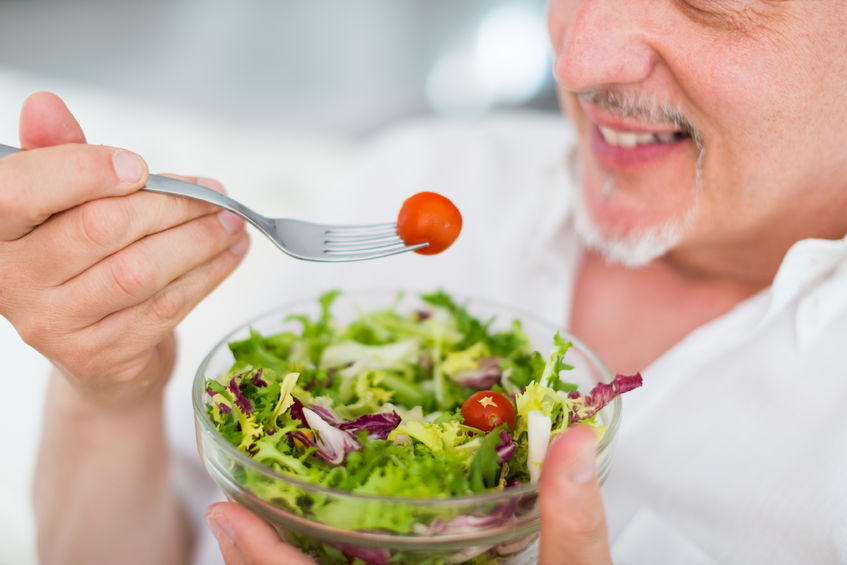Are You Eating This?
Ensuring that one eats adequate nutrition is a challenge at any age. Most of us know that eating a diet filled with vegetables and fruits, while limiting our intake of processed foods and red meats is healthier for us. We feel healthier and have more energy when our diet is well-balanced. Eating healthier even helps with the aging process and can prevent chronic illness such as cardiovascular disease or type 2 diabetes.
Seniors especially need to monitor closely what they ingest. While some think that they’ve reached the point of carte blanche, the opposite is the reality. The number of calories an older adult requires declines as they age. With age, the body no longer absorbs key nutrients as it once did in years past. Seniors also experience a decline in their taste buds and may even have difficulty chewing or digesting certain foods. Therefore, each calorie a senior consumes should be packed with nutrition.
March is National Nutrition Month. While there isn’t a one-diet-fits-all solution for seniors, a healthy eating plan that’s packed with nutritious foods can help older adults receive the proper nutrients their bodies need. Here are the top five nutrients every senior needs to include in their daily diet, and where to get them.
Calcium & Vitamin D
Calcium and vitamin D go together when it comes to nutrition because vitamin D actually helps the body absorb calcium. Together, they help the body build and maintain strong bones, as well as prevent osteoporosis. Vitamin D also protects the body against some chronic diseases. A lack of calcium and vitamin D increases the risk of brittle bones, falling, and fractures. Calcium is found in all sorts of dairy products, such as milk and yogurt, and some vegetables such as broccoli and kale. The best way to fill up on vitamin D is by exposing your skin to the sunlight for about ten minutes. If you can’t head outdoors, look for foods fortified with vitamin D, such as cereals, juices, even milk and yogurt.
Potassium
Struggle with high blood pressure? Try adding potassium to your diet. Potassium not only helps keep the body’s bones strong, but is an essential mineral for cell, tissue, and organ function. It can even reduce the risk of developing kidney stones. The best way to include potassium in your diet is to eat fruits and vegetables at each meal. The fruits with the most potassium per bite include bananas, prunes, and plums. Potatoes with their skin is the richest in potassium vegetables. Other options for potassium include beans and meat.
Fiber
Fiber is a nutrient that not only helps you fill full longer, but also helps keep things moving along through the digestive tract. Many older adults suffer from constipation, which can make life miserable. Unfortunately, some medications that seniors take to manage chronic conditions have the side effect of constipation. Some foods can even lead to constipation, such as cheese, chocolate, and refined grains. Help your body get plenty of fiber by eating more whole grains, beans, fruits, vegetables, and nuts. Like vitamin D, some foods are fortified with fiber, such as cereals and granola bars. Choose these foods if you struggle to get plenty of fiber.
Vitamin B12
If you’re over the age of 50, you may be deficient in vitamin B12. Vitamin B12 deficiency is often overlooked in most older adults, until it causes a significant health problem. The most common health conditions linked to a vitamin B12 deficiency include anemia, neuropathy, and cognitive impairment. Vitamin B12 is vital to making red blood cells and maintaining proper nerve cell function. The ability for the body to absorb vitamin B12 decreases with age. To combat this, be sure to munch on foods rich in B12, such as fish, poultry, eggs, meat, and milk.
Water
Water may seem like an odd nutrient that seniors often miss, but it is vital for good health and digestion. Older adults experience a decline in their sense of thirst, and they may not even realize that they are dehydrated. Water helps flush the body of toxins, keeps the digestive tract moving along, and helps the body absorb essential nutrients. There is a debate about how much water one needs per day. Some recommend eight glasses of fluids a day, while others argue that you only need three to five glasses. The best way to ensure you’re getting enough water is to peek at the color of your urine. If it is bright or dark yellow, it means you are not drinking enough water. Fill up a water bottle and carry it with you throughout your day, or drink one glass of water before each meal to help ensure you get plenty of water each day.
Do you struggle to eat nutritious meals? Visiting Angels Punta Gorda is here to help. Our ability to provide a wide range of in-home services for our elderly clients makes us stand out from other home care agencies in the area. Some of the services our clients choose to receive include meal preparation, along with assistance with bathing or light housekeeping. Let us help you plan and prepare healthy meals that you can enjoy throughout the week, ensuring you receive adequate nutrition. We can even escort you to the grocery store so that you can select your favorite produce and brands or do the shopping for you while you relax at home with a book. If you are ready to learn more about our friendly, compassionate services, please contact us today by calling 941-347-8288 Punta Gorda or 239-226-1620 Lee County.

